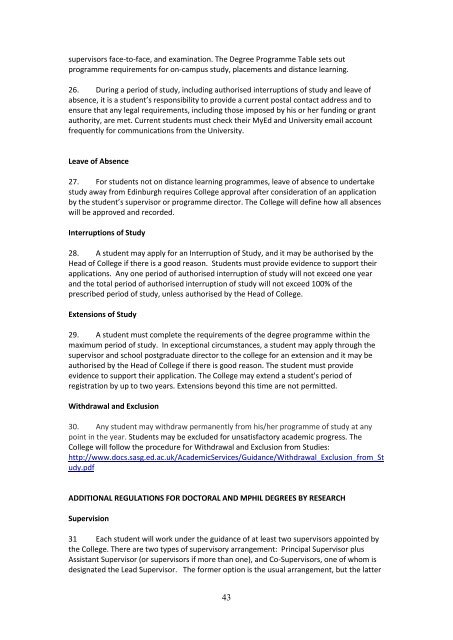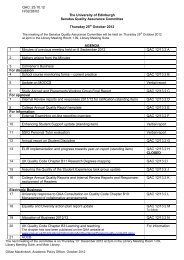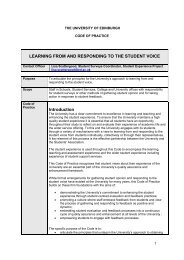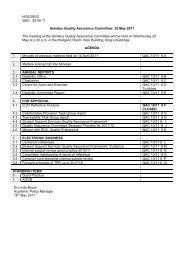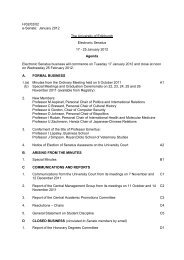Chapter 3 â Policy Implications for Gaelic - University of Edinburgh
Chapter 3 â Policy Implications for Gaelic - University of Edinburgh
Chapter 3 â Policy Implications for Gaelic - University of Edinburgh
Create successful ePaper yourself
Turn your PDF publications into a flip-book with our unique Google optimized e-Paper software.
supervisors face-to-face, and examination. The Degree Programme Table sets out<br />
programme requirements <strong>for</strong> on-campus study, placements and distance learning.<br />
26. During a period <strong>of</strong> study, including authorised interruptions <strong>of</strong> study and leave <strong>of</strong><br />
absence, it is a student’s responsibility to provide a current postal contact address and to<br />
ensure that any legal requirements, including those imposed by his or her funding or grant<br />
authority, are met. Current students must check their MyEd and <strong>University</strong> email account<br />
frequently <strong>for</strong> communications from the <strong>University</strong>.<br />
Leave <strong>of</strong> Absence<br />
27. For students not on distance learning programmes, leave <strong>of</strong> absence to undertake<br />
study away from <strong>Edinburgh</strong> requires College approval after consideration <strong>of</strong> an application<br />
by the student’s supervisor or programme director. The College will define how all absences<br />
will be approved and recorded.<br />
Interruptions <strong>of</strong> Study<br />
28. A student may apply <strong>for</strong> an Interruption <strong>of</strong> Study, and it may be authorised by the<br />
Head <strong>of</strong> College if there is a good reason. Students must provide evidence to support their<br />
applications. Any one period <strong>of</strong> authorised interruption <strong>of</strong> study will not exceed one year<br />
and the total period <strong>of</strong> authorised interruption <strong>of</strong> study will not exceed 100% <strong>of</strong> the<br />
prescribed period <strong>of</strong> study, unless authorised by the Head <strong>of</strong> College.<br />
Extensions <strong>of</strong> Study<br />
29. A student must complete the requirements <strong>of</strong> the degree programme within the<br />
maximum period <strong>of</strong> study. In exceptional circumstances, a student may apply through the<br />
supervisor and school postgraduate director to the college <strong>for</strong> an extension and it may be<br />
authorised by the Head <strong>of</strong> College if there is good reason. The student must provide<br />
evidence to support their application. The College may extend a student's period <strong>of</strong><br />
registration by up to two years. Extensions beyond this time are not permitted.<br />
Withdrawal and Exclusion<br />
30. Any student may withdraw permanently from his/her programme <strong>of</strong> study at any<br />
point in the year. Students may be excluded <strong>for</strong> unsatisfactory academic progress. The<br />
College will follow the procedure <strong>for</strong> Withdrawal and Exclusion from Studies:<br />
http://www.docs.sasg.ed.ac.uk/AcademicServices/Guidance/Withdrawal_Exclusion_from_St<br />
udy.pdf<br />
ADDITIONAL REGULATIONS FOR DOCTORAL AND MPHIL DEGREES BY RESEARCH<br />
Supervision<br />
31 Each student will work under the guidance <strong>of</strong> at least two supervisors appointed by<br />
the College. There are two types <strong>of</strong> supervisory arrangement: Principal Supervisor plus<br />
Assistant Supervisor (or supervisors if more than one), and Co-Supervisors, one <strong>of</strong> whom is<br />
designated the Lead Supervisor. The <strong>for</strong>mer option is the usual arrangement, but the latter<br />
43


